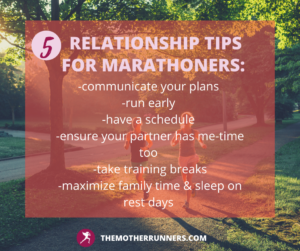Training for a marathon and being in a marriage have a lot in common. They both require a lot of work, grit, and commitment.
And let’s face it. Marathon training is hard—even for people with no kids and lots of time. So, for time-poor parents, it can be nearly impossible.
When we became parents, some of my most heated disagreements with my husband were related to running. I wanted to go but the kids were melting down and he needed back-up, or we both needed/wanted to run and only had time for one of us, or I would take longer than I said I’d be, or I would come home from a run with the house turned upside down because he was keeping the kids entertained and I was then annoyed by the mess…
Do I need to go on? You get the picture.
Marathons and marriage

I’ve learned from other mother runners, these are common scenes among many households of runners training for a marathon or race: The husband and wife get home and the demands of life continue to pile up (sports practices, homework, dinner, baths, packing lunches, cleaning, lingering work emails…).
Meanwhile, both partners want or need their me-time. So how do you balance marathon training with the rest of life?
Mother Runners everywhere are figuring this out and I’ve asked them to dish. For me personally, it took time and my kids maturing for my husband and me to get the knack of training for a marathon without it being a strain on our relationship. In fact, we were able to both successfully train together for two marathons in 2019 (pre-pandemic) with our kids being 2 and 5. This training included me running high mileage and my husband doing destination trail runs. But we got it done!
I asked mother runners (and some father runners) for their advice and share their secrets, and ours, for how to maintain a healthy relationship while training for a marathon. Before I share, let’s look at warning signs that your marathon training is hurting your marriage.
How can you tell if your marathon training is hurting your marriage?
There are two common signs that your marathon training is hurting your marriage or relationship.
- Your partner seems distant, uninterested in your training, and even resentful.
- You are dropping the ball on your family obligations and/or your partner doesn’t have time to do something for themselves.
What should you do if your marathon training is hurting your marriage?
If your marathon training is hurting your marriage or relationships, the first thing you need to do is talk with your partner.
“Be willing to listen to their thoughts and feelings, even if you don’t agree with them and problem-solve together to come up with solutions that work for both of you,” advises marathoner and therapist, Amanda Steman. “If you’re in an otherwise healthy relationship, it’s usually the case that when you’re open, honest, and vulnerable with your partner you’re able to come up with solutions that work for everyone.”
If you can’t, enlist the help of a professional therapist who can help facilitate those conversations.
Ultra-marathoner and father runner Jeff Le, who has been featured in Runner’s World, shares this recipe for success:
“Make sure why the race you’re training for is important and meets your personal happiness and fulfillment. And ensure you’re pitching in on your partner’s goals and aspirations.”
If your training requires a temporary imbalance in your relationship, commit to taking a break after the race with at least two weeks of zero running, he notes.
Related: Why You Should Take a Break from Running
You may also want to edit your race schedule so that you train for one marathon a year and conquer shorter, faster distances that require less time commitment the rest of the year.

In the meantime, here are relationship tips for marathoners so your marathon training doesn’t hurt your marriage or relationship.
8 Relationship Tips for Marathoners
Set expectations.
Before you begin your marathon training, sit down with the people in your life who will be impacted and share what you expect your schedule to be like.
Jamie King, an ultrarunner and mama to a 3-year-old, says “I try and keep my partner (and friends!) abreast of my training schedule so that everyone has reasonable expectations as to where I am and why I’m maybe not as available or responsive.”
Plan your runs.
Every Sunday, King and her partner go over their schedules for the week to ensure everyone is on the same page.
“We literally jot down everything that is happening the following week so — our personal needs, our kids’ needs and care, relationship needs, and of course work schedules. Doing this really helps us determine any potential issues and come up with solutions together that make each of us feel supported.”
In our family, we have a mostly regular schedule where it is understood that I will run early or long certain days of the week.
“When you are consistent, the people in your life know that is what you do at that time. Just like everyone else takes time for their hobbies, so do you!” says running coach Carina Heilner.
Communicate your plans.
Heather Hanks, a mom of two, sums up the core way to maintain a healthy relationship while training for a marathon—communicate! “Communication is key so that you don’t end up resenting your spouse.”
Tell them your plans and make sure it works for them. Ensure they get their needs met, too.
If your partner seems aggravated, have a conversation about why they feel this way, advises Heilner. “Do they want more attention from you? Are you too tired to do other fun things with them? If you can figure out what the root of the aggravation is, you can work on a solution together.”
Make it a “Must.”

Oddly enough, making running non-negotiable was the solution to my husband and my problem of us both wanting to run but neither of us getting to.
Instead of negotiating who gets to go, we set in stone that it was equally important for both of us. We made it a “must” to look at the schedule regularly and figure out who goes when. This ensured we both got our run time and no resentment built.
Related: 11 Strategies to Bust Barriers to Exercise
Ensure equal time.
Now, that “me” time may be running for you and something completely different for your partner. Whatever it is, make sure he knows you want him to have it and that he gets it. After all, we need to practice what we preach to our kiddos that sharing is caring.
As one Mother Runner puts it, “The bottom line is we support each other in our goals. It makes us better partners and parents when we get our runs in!”
Many husband-and-wife teams alternate running on the weekends (mom gets a long run on Saturday and dad gets it on Sunday) or alternate early morning wake-ups so each partner gets time to sleep in a bit more. Some running couples get a babysitter so they can run together if their kids are still young.
Run in the morning.
The secret weapon of MOST mother runners is to run at a time when you’ll impact the least amount of people. This likely means running in the pre-dawn hours. When I’m in the intense phases of my marathon training, I will wake up before 4 am a couple days a week to get my track workouts and long runs in.
King does the same. “I typically wake up before the sun to run and stay very disciplined about it! I even try to squeeze my long runs in on weekdays so that I can dedicate Saturday afternoons and all of Sunday off (recovery day!) to catch up with family and friends.”
Related: How to Become a Morning Runner
Plan time together.
Your relationship with your partner serves as a foundation for everything else. It is like a garden that needs to be watered so everything else can grow and flourish. So, it’s important to water it with solo time together on a regular basis.
Erica Hopper, a mother runner and food blogger at Sugar and Salt, practically wakes in the middle of the night to run so she doesn’t impinge on family time. However, this means she goes to bed before her husband. To balance it out, she stays up a couple nights a week so that she and her husband can have some quiet time after the kids go to bed.
When our kids got a bit older, my husband and I started having regular date nights every two weeks at a nearby restaurant so we could have a conversation without interruptions. It’s amazing how a change of scenery can strengthen a connection.
Focus on weekly balance.
It is close to impossible to balance the demands of training, being a partner, mother, professional, etc. and a human being who needs sleep on a daily basis. So, aim to fulfill these roles weekly, says Emily Coffman host of the podcast Live Your Personal Best.
“On the days when you have a date night, you might have to sacrifice an earlier bedtime. On days that you do a run after work, you might have to sacrifice sitting at the dinner table with your partner together. The goal isn’t to fit in everything every day but to have a balance throughout each week that will leave you healthy and happy.”
“When it comes to finding actual time with my loved ones, it’s a careful balance of finding time to run, finding time to sleep, and finding time to be present with family and friends,” adds King.
I love running in the early mornings because it enables me to focus on my family. But I know that I will be tired in mid-week from the wake-ups. I also know there is a reprieve come Friday so that makes it manageable!
Aim to prioritize your family and health (SLEEP) on your rest or easy days. And, be completely focused on your family when you’re with them.
If you need help balancing your training and goals with family and life, I want to help! Learn more about our Coaching Services.

Thanks for including me in this article – such great tips!
Thanks for your awesome tips, Jamie!